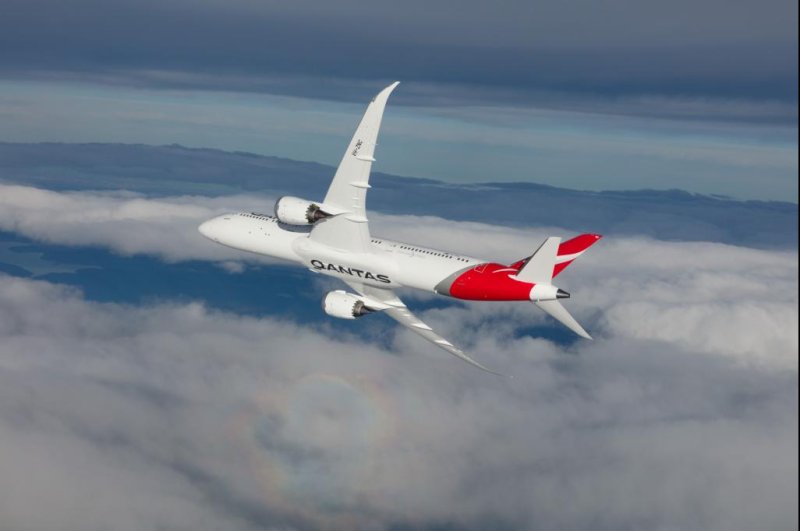For the first time, Qantas is testing a Boeing 787-9 nonstop between New York's JFK Airport and Sydney, Australia. Photo courtesy Qantas
Oct. 19 (UPI) -- A planned 19.5-hour test flight took off from New York's John F. Kennedy Airport on Saturday en route to Sydney Airport in Australia.
Fifty passengers and crew were aboard the Boeing 787-9 Dreamliner in the first non-stop flight between the two cities, CNN reported. The 10,200-mile journey is due to arrive in Sydney on Sunday morning.
The actual travel time for Qantas Flight 7879 is subject to weather conditions.
"Months of flight planning has gone in to determining the optimum flight path, including running daily plans to establish wind and weather patterns," the airline said on its website.
Those on board will include six Qantas frequent flyer members.
Four pilots will rotate during the flight, with two additional pilots in the cabin, Qantas said.
The aircraft has 42 business, 28 premium economy and 166 economy seats.
The new 787-9 aircraft was delivered from the Boeing factory in Seattle to New York.
The non-stop flight is named "Project Sunrise" after the airline's "Double Sunrise" endurance flights during World War II, which were long enough to see two sunrises.
Two other "Project Sunrise" test flights will be conducted. In November a flight will travel from Sydney, and another New York-Sydney flight is scheduled before the end of the year.
Eventually Qantas wants to operate direct flights from Australia's Sydney, Melbourne and Brisbane to New York and London by 2022.
The only direct flight from Australia to Europe is 9,000 miles from Perth to London. That service started in March 2018.
A current New York to Sydney flight with a stopover in Los Angeles takes 22 hours and 20 minutes.
During Saturday's test flight, passengers in the main cabin will wear monitoring devices.
Experts from Charles Perkins Center, a research institution in Australia, will study how their "health, wellbeing and body clock" are impacted by lighting, food and drink, movement, sleep patterns and inflight entertainment. Passengers also will be asked to keep a log before the flight and weeks afterward.
Cameras will be mounted in the cockpit.
"People seem to be wildly different when it comes to the experience of jetlag -- and we need more research on what contributes to jetlag and travel fatigue, so we can try and reduce the impact of long-haul flights," Dr. Stephen Simpson, academic director of the University of Sydney's Charles Perkins Centre, told CNN. "We have a long way to go in terms of understanding how the wide variety of influences -- including nutrition, hydration, exercise, sleep and light -- might work together for maximum benefit."
The aircraft weight at takeoff for the flight is 514,000 pounds, of which 222,666 pounds is fuel.















